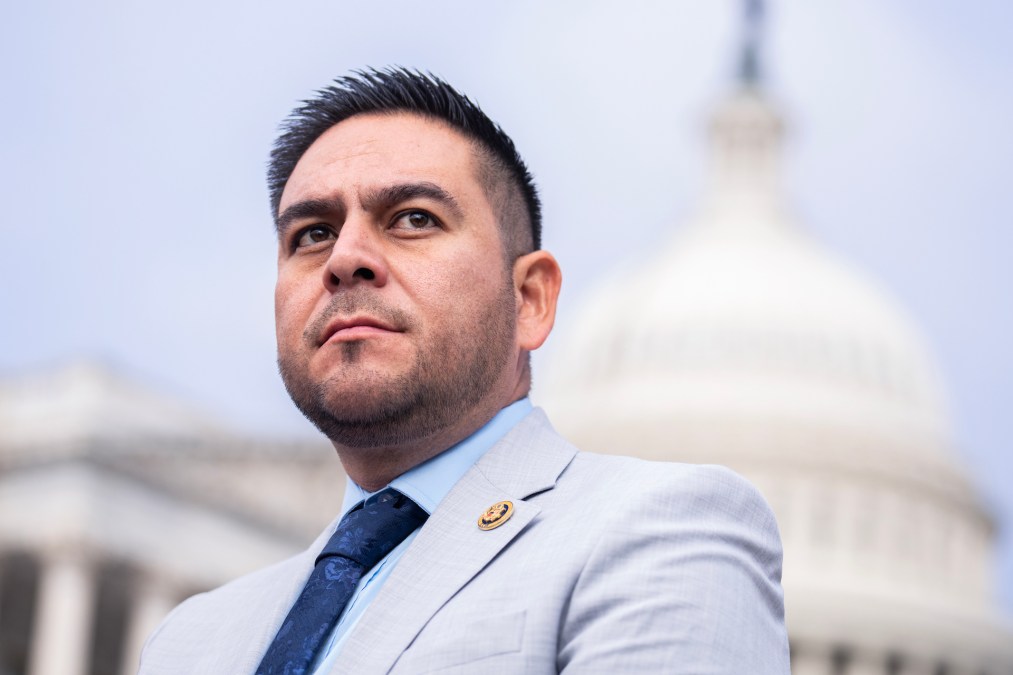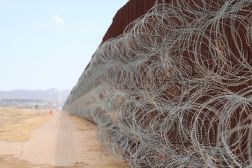Lawmaker spotlights growing calls for interagency plan to counter drone threats in US

While the U.S. military and federal agencies move to rapidly expand their arsenals and adoption of counter-drone capabilities under the second Trump administration, experts warn the government lacks a unified interagency strategy to collectively protect American communities from emerging drone threats.
Rep. Gabe Vasquez, D-N.M., wants to change that.
“This is a national security issue, and I’m calling on the administration to give law enforcement the tools they need to keep our communities safe,” Vasquez told DefenseScoop in an email Tuesday.
As a member of the House Armed Services Committee who says he’s witnessed impacts of cartel-involved drone activity in his home state during past trips to the U.S.-Mexico border, Vasquez sent a letter this week urging Defense Secretary Pete Hegseth, Attorney General Pam Bondi, Homeland Security Secretary Kristi Noem and FAA Administrator Bryan Bedford to jointly establish “new, clear, and effective federal guidance to address the rising threat that illicit drone usage poses to public safety and national security.”
President Donald Trump issued a slew of policies this summer directing the Pentagon and federal agencies to buy and deploy more American-made uncrewed aerial systems and counter-UAS platforms in a way that simultaneously propels the nation’s drone industry as they modernize contemporary operations.
His mandates are being pursued at a time when drone threats associated with surveillance, disruption, or attacks are increasing — and the military is prioritizing work and investments in defensive weapons, electronic warfare, and sensor protection to safeguard its facilities domestically and abroad.
“Along the border in my district, cartels and Transnational Criminal Organizations (TCOs) use drones to carry out their illegal operations. This includes scouting the movement patterns of Border Patrol agents, gathering intelligence about weaknesses in border infrastructure, and physically moving illegal contraband over the border and into the United States,” Vasquez wrote in the letter to agency leaders. “Cartels have even threatened to crash drones strapped with explosives into U.S. law enforcement personnel.”
The One Big Beautiful Bill Act, signed into law by Trump in July, notably includes a $500 million grant program for states and cities to purchase counter-drone assets and training — among other major funding — ahead of hosting the 2026 FIFA World Cup, the 2028 Olympics, and America’s 250th anniversary celebrations.
State, local, tribal and territorial governments currently do not have official authorizations to fully employ certain enhanced counter-drone technologies, unless formally deputized.
Echoing recent requests from stakeholders for a more coordinated plan, Vasquez called on Hegseth and the other department heads to “implement a comprehensive all-of-government approach that gives law enforcement agencies at all levels the authorities they need to protect communities and national security assets from these threats.”
“It is also imperative that you prioritize developing and deploying effective counter-drone technology that will allow agencies to engage drones being utilized by bad actors,” Vasquez wrote.
The lawmaker said senior military officials in his district have also warned him directly about recent, serious drone incursions at White Sands Missile Range — and what he referred to as the Defense Department’s “limited capacity to detect or counter them.”
That range is a U.S. military hub for advanced research, development and testing. Vasquez said defense officials there have repeatedly asked for clear guidance regarding when and how to engage drones that enter restricted airspace.
“I’ve spent a lot of time on the border and seen firsthand how cartels are using drones to outpace our agents. I’ve also met with leaders at [WSMR] who have flagged concerns about drone incursions at our U.S. military installations, putting sensitive military intelligence at risk,” Vasquez told DefenseScoop. “Border Patrol and local police have raised the same alarms, and I am listening: we need federal action to counter criminal drone activity now.”
The congressman’s letter also highlighted alerts from police officers in Albuquerque — located 200 miles from the southern border — who he said have warned him about alleged criminal drug traffickers flying drones for counter-surveillance efforts in their jurisdiction.
“Beyond combating the cartels, local law enforcement continues to deal with drone incursions from unknown origins over the city. Local police departments are unable to properly identify who are flying these drones, and they do not have the resources and guidance needed from the federal government to effectively engage them,” Vasquez wrote.
He emphasized that these types of drone threats are a nationwide issue that is not limited to New Mexico.
“I urge you to work with each other, with Congress, and with all other necessary agencies to find a swift, effective, and bipartisan solution to this problem,” Vasquez wrote to Hegseth, Bondi, Noem and Bedford.
When asked on Tuesday about concerns raised in the letter, a Pentagon official told DefenseScoop that “as with all congressional correspondences, the department will respond directly to the authors.”






